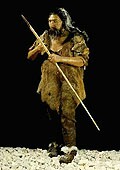- Double Mastectomy May Offer No Survival Benefit to Women With Breast Cancer
- Toxic Lead Found in Cinnamon Product, FDA Says
- Certain Abbott Blood Sugar Monitors May Give Incorrect Readings
- Athletes Can Expect High Ozone, Pollen Counts for Paris Olympics
- Fake Oxycontin Pills Widespread and Potentially Deadly: Report
- Shingles Vaccine Could Lower Dementia Risk
- Your Odds for Accidental Gun Death Rise Greatly in Certain States
- Kids From Poorer Families Less Likely to Survive Cancer
- Tough Workouts Won’t Trigger Cardiac Arrest in Folks With Long QT Syndrome
- At-Home Colon Cancer Test Can Save Lives
Neanderthal Poop Yields Clues to Early Man’s Diet


Samples of 50,000-year-old feces from Neanderthals in Spain offer new insight into the diet of man’s extinct human cousins, a new study says.
While meat was their main source of food, the Neanderthals ate more vegetables than previously thought, an analysis of so-called biomarkers from the fecal samples suggests.
The five specimens found in El Salt may be the oldest known human fecal matter, the researchers said in the June 25 issue of the journal PLoS One.
“This study represents the first approach to Neanderthal diet through the analysis of fecal markers found in archaeological sediment,” said Ainara Sistiaga, of the Massachusetts Institute of Technology and the University of La Laguna in Spain, and colleagues in a journal news release.
Current methods used to investigate the Neanderthal diet use isotopes and focus on the meat, which may be overemphasized, according to the study authors.
They said future studies using their biomarker approach may help reveal more information about the role of vegetables in the diet of these ancient people.
More information
The Smithsonian National Museum of Natural History has more about Neanderthals.
Source: HealthDay
Copyright © 2024 HealthDay. All rights reserved.










